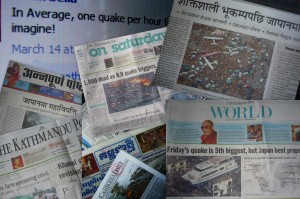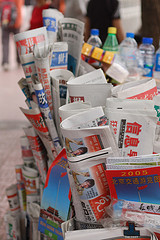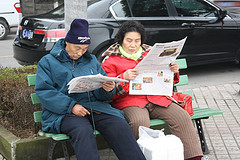Asian media coverage of Japan in crisis
 Recent events in Japan shocked the world. The magnitude 9.0 earthquake that hit on March 11th and the tsunami and nuclear disaster it triggered have been top developing stories for media everywhere. But the focus and style of reporting differ from one country or region to the next.
Recent events in Japan shocked the world. The magnitude 9.0 earthquake that hit on March 11th and the tsunami and nuclear disaster it triggered have been top developing stories for media everywhere. But the focus and style of reporting differ from one country or region to the next.Lee W., a former DW-AKADEMIE trainee from Beijing notes that the massive destruction in Japan was a top story on every website in China. Micro-blogs have become a very popular source of information for the Chinese, especially the younger generation. “It’s changing China by invading the heart of the young,” says Lee. To see an example go to www.sina.com.cn, and log in to become a member of a micro-blog.
Initially the Chinese media were primarily concerned with Japan’s rescue efforts which appeared to be well-organized. Attention was given to the quality of urban buildings and how they seemed to be better than those in China. The Chinese media reported on the orderliness of the post-quake society. But as time passed and images of rural areas were later released, the Chinese noted inefficient efforts for people who desperately need food and water. “Many only have an apple for an entire day.” Then there were the problems with the nuclear plant’s reactors, evacuation efforts that were not time-efficient and news not issued on time which triggered some criticism.
Public fear of nuclear radiation
 the nuclear crisis. According to Lee that’s because the government has huge plans to build nuclear power plants which have aroused deep public concern. “Our state council has now ceased the construction of the ongoing nuclear plant program and stopped authorizing new ones.”
the nuclear crisis. According to Lee that’s because the government has huge plans to build nuclear power plants which have aroused deep public concern. “Our state council has now ceased the construction of the ongoing nuclear plant program and stopped authorizing new ones.” The fear of radiation surpasses many other issues, so much so that ordinary people have been duped by speculators who released underground rumors that salt helps prevent the effects of radiation. “Today the salt in many Chinese cities is sold-out, forcing the government to come forth to comfort the people.” It’s a pity, says Lee, that people are paying money for something that will be of no use and only benefits the speculators, but it’s also understandable because poor people often have only themselves to rely on and this was at least something they could do that gave them some peace of mind.
The fear of radiation surpasses many other issues, so much so that ordinary people have been duped by speculators who released underground rumors that salt helps prevent the effects of radiation. “Today the salt in many Chinese cities is sold-out, forcing the government to come forth to comfort the people.” It’s a pity, says Lee, that people are paying money for something that will be of no use and only benefits the speculators, but it’s also understandable because poor people often have only themselves to rely on and this was at least something they could do that gave them some peace of mind.
Contributed by Lee W. in Beijing, edited by Deborah Friedman




